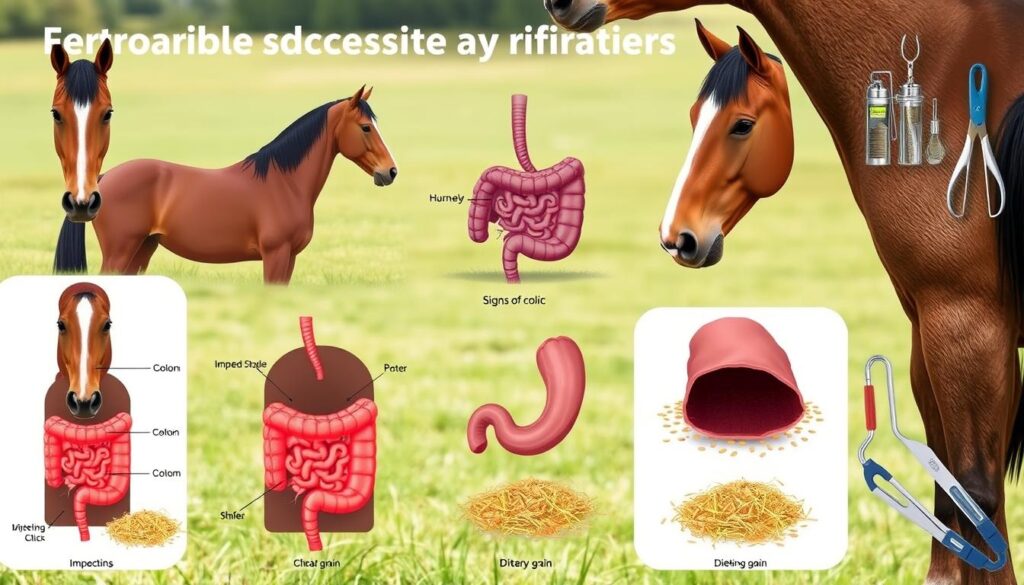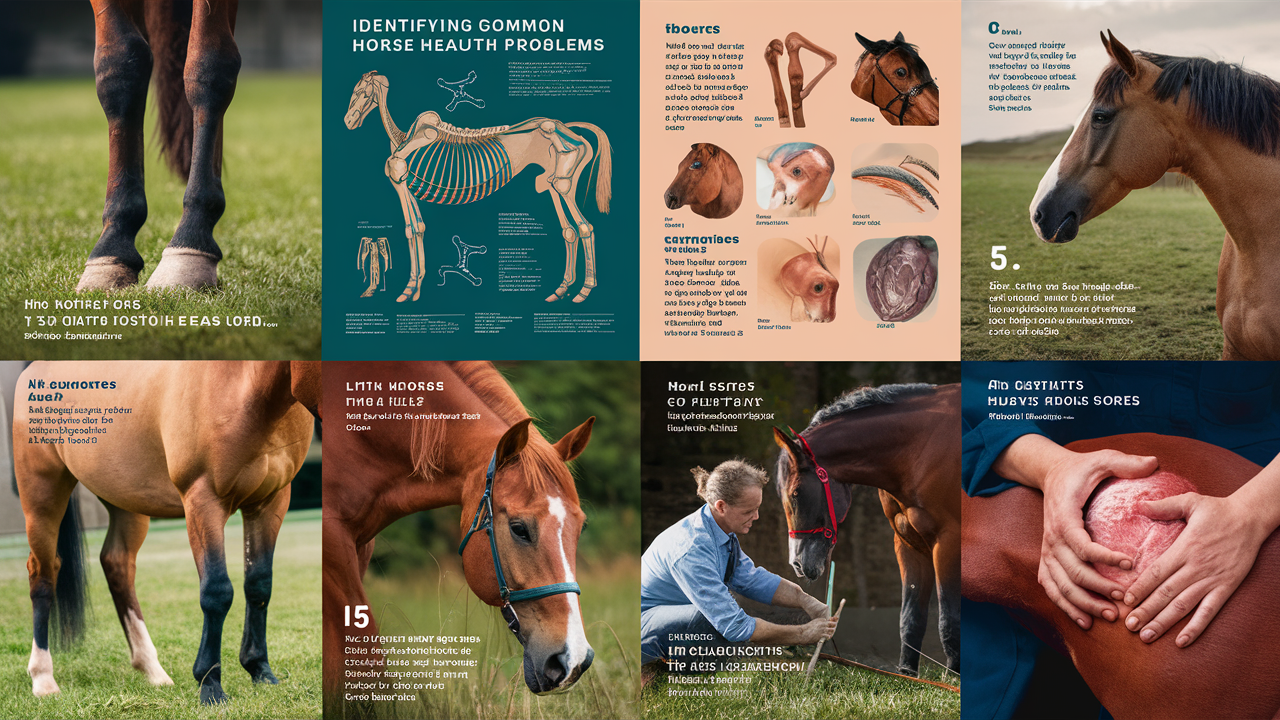As a horse owner, knowing about common health issues is key. This guide will help you understand and manage these problems. It covers everything from basic health checks to emergency care.
It’s important to spot the signs of health issues in horses. Knowing about common problems lets you prevent and manage them. This way, your horse can stay healthy and happy.
Introduction to Equine Health
Equine health issues can be minor or serious. Knowing about common problems like digestive, respiratory, and lameness issues is crucial. This knowledge helps you make better care decisions and know when to seek vet help.
Key Takeaways
- Understanding common horse health problems is crucial for providing proper care
- Recognizing the signs of horse ailments and equine health issues is essential for early intervention
- Basic health monitoring can help prevent and manage common horse health problems
- Equine health issues can range from minor to severe, requiring different levels of care
- Professional veterinary care is necessary for addressing specific horse ailments and equine health issues
Understanding Common Horse Health Problems
As a horse owner, knowing about common health issues is key. Horse sickness can be mild or severe. Catching it early is vital for treatment. Watching your horse closely can spot problems early.
Healthy horses show signs like shiny coats and bright eyes. Sick horses may seem tired, eat less, or act differently. It’s important to notice these signs and act fast.
Signs of a Healthy Horse
- Shiny coat and healthy skin
- Bright, alert eyes
- Robust appetite and regular bowel movements
- Strong, sturdy legs and joints
When to Be Concerned
See a vet if you notice these signs:
- Changes in appetite or water intake
- Unusual behavior, such as lethargy or restlessness
- Physical changes, such as swelling or discharge
Basic Health Monitoring Tips
Regular checks can catch issues early. Here are some tips:
- Check your horse’s temperature, pulse, and respiration rate daily
- Monitor your horse’s appetite and water intake
- Inspect your horse’s coat, skin, and legs for any signs of injury or illness
Knowing about common health issues and monitoring your horse can prevent diseases. This ensures your horse stays happy and healthy.
Essential Vital Signs and Their Significance
Checking a horse’s vital signs is key for horse health maintenance. Regular checks can spot issues early, helping to prevent bigger problems. Horse veterinary care experts say knowing normal ranges is crucial to catch health problems.
Important vital signs include temperature, pulse, breathing rate, and how fast blood returns to the skin. By learning these basic checks, horse owners can help keep their horses healthy. Here are some key vital signs and their normal ranges:
- Temperature: 99-101°F (37-38°C)
- Pulse: 28-44 beats per minute
- Respiration rate: 12-24 breaths per minute
- Capillary refill time: less than 2 seconds
Knowing these vital signs is essential for horse health maintenance. For instance, a high temperature can mean infection or inflammation. An increased pulse rate might show stress, pain, or heart problems. Regular checks help spot issues early, allowing for quick horse veterinary care.
Respiratory Issues in Horses
Respiratory problems are a common horse medical condition that can greatly affect a horse’s life. Heaves and chronic obstructive pulmonary disease (COPD) are two major issues. These can cause coughing, wheezing, and breathing trouble, which is hard for both the horse and its owner.
It’s important to know what causes these equine health issues. Heaves and COPD often come from dust, mold, and pollen. These can start allergic reactions and inflammation in the airways. Upper respiratory infections, caused by viruses or bacteria, can also lead to symptoms like nasal discharge and coughing.
Heaves and COPD
Heaves and COPD need long-term care and treatment. Treatment might include medicines like bronchodilators and corticosteroids. Also, making the living space dust-free and using a HEPA air purifier can help.
Upper Respiratory Infections
Upper respiratory infections can be treated with antibiotics or antiviral meds. It’s key to work with a vet to find the best treatment. They can help manage horse medical conditions and prevent future problems.
Treatment Options
There are many ways to treat respiratory issues in horses. Some important steps include:
- Keeping the living space clean and dust-free
- Using a HEPA air purifier to cut down on airborne particles
- Starting a regular exercise and training program to boost lung function
- Working with a vet to create a detailed treatment plan
By understanding the causes and risk factors of respiratory issues in horses, owners can help manage equine health issues. This can improve their horse’s health and well-being.
Digestive System Disorders
The equine digestive system is complex and prone to various disorders. These are considered common horse health problems. If not recognized and treated promptly, they can lead to severe horse ailments.
Factors like poor feeding practices, inadequate water intake, and stress can cause digestive problems in horses. It’s important to notice signs of distress. These include changes in appetite, abdominal pain, and changes in stool quality.
To prevent digestive disorders, proper feeding practices and management are key. This means providing high-quality feed, ensuring clean water, and managing stress. Regular veterinary check-ups can also help catch issues early.
Some key strategies for maintaining a healthy digestive system in horses include:
- Providing a balanced diet that meets the horse’s nutritional needs
- Ensuring access to clean water at all times
- Managing stress levels through regular exercise and social interaction
- Implementing regular veterinary check-ups to monitor digestive health

By understanding the causes of digestive disorders and implementing preventive measures, horse owners can help reduce the risk of common horse health problems. This promotes overall health and well-being in their horses.
| Digestive Disorder | Causes | Symptoms |
|---|---|---|
| Colic | Poor feeding practices, inadequate water intake | Abdominal pain, changes in appetite |
| Gastric Ulcers | Stress, poor feeding practices | Abdominal pain, changes in appetite |
| Diarrhea | Infectious agents, poor feeding practices | Changes in stool quality, abdominal pain |
Lameness and Musculoskeletal Problems
Lameness is a big problem for horses, affecting their performance and happiness. Horse vet care is key in finding and treating lameness. Regular checks and early detection can stop long-term damage and improve treatment results.
Hoof issues, joint problems, and soft tissue injuries are common lameness causes. A detailed physical check, imaging, and lameness tests are vital. These help find the cause and plan the best treatment.
Diagnostic Approaches
- Physical exams to check the horse’s health and find lameness causes
- Imaging like X-rays and ultrasound to check joints and soft tissues
- Lameness tests to look at the horse’s gait and movement
Treatment Strategies
Treatment for lameness and musculoskeletal issues depends on the cause and how bad it is. Rest, medical treatments, and surgery might be needed to ease pain, help healing, and improve mobility. Keeping a close eye on the horse and adjusting the treatment plan is important for the best results.
| Cause of Lameness | Diagnostic Approach | Treatment Strategy |
|---|---|---|
| Hoof problems | Physical examination, imaging techniques | Trimming and shoeing, pain management |
| Joint issues | Imaging techniques, lameness evaluations | Medical treatments, surgical interventions |
| Soft tissue injuries | Physical examination, imaging techniques | Rest and rehabilitation, medical treatments |
Skin Conditions and External Parasites
Keeping a horse healthy is key. Skin problems and parasites can make them very uncomfortable. Issues like rain rot, scratches, and allergies are common. Ticks, lice, and mites can also bother them, leading to infections.
Good grooming is a must. Brushing and cleaning the coat regularly helps. Keeping their living area clean and dry also helps. Treatments like medicated shampoos can help with these problems.
- Regular grooming to remove dirt and debris
- Keeping the horse’s living area clean and dry
- Using topical treatments as needed to treat skin conditions and external parasites
- Providing a balanced diet that includes essential nutrients for skin health
By following these tips, owners can keep their horses healthy. This reduces the chance of equine health issues.
Dental Problems and Oral Health
Good oral health is key for a horse’s well-being and performance. Regular horse health maintenance helps prevent dental issues like sharp points, hooks, and wave mouth. These problems can cause eating troubles, weight loss, or behavioral changes. This shows why horse veterinary care is important.
Signs of dental issues may include:
- Difficulty chewing or swallowing
- Weight loss or decreased appetite
- Bad breath or unusual odors
- Changes in behavior, such as irritability or reluctance to work
Preventive care is vital for oral health. Regular dental check-ups and floats can spot problems early. Horse health maintenance should include annual dental exams and floats as needed. This ensures the horse’s teeth are aligned and free of sharp edges.
In some cases, complex dental problems need an equine dental specialist. These experts offer advanced horse veterinary care. They can do dental surgery or other treatments for issues that routine care can’t fix.
Emergency Health Situations
It’s key for horse owners to know how to handle emergency health situations. Horse sickness can come from many things like severe colic, acute laminitis, and injuries. You need to figure out how serious it is and when to get a vet right away.
Some common emergencies include:
- Severe colic: intense pain in the belly
- Acute laminitis: inflammation in the hoof tissues
- Traumatic injuries: wounds, fractures, or injuries from accidents
If there’s an emergency, stay calm and use basic first aid. This means keeping the horse safe, giving any medicine it needs, and watching its vital signs. Equine diseases can get worse fast, so acting quickly is key to avoid more problems.
While waiting for help, it’s important to be ready. Have a first aid kit, know where the nearest vet is, and know the signs of horse sickness. These steps help ensure your horse gets the best care in emergencies.

Being ready for emergencies is a big part of being a responsible horse owner. Knowing the signs of equine diseases and how to act helps protect your horse and give them the best care.
| Emergency Situation | Signs and Symptoms | Immediate Action |
|---|---|---|
| Severe Colic | Intense abdominal pain, sweating, and restlessness | Call a veterinarian, provide a safe environment, and administer any prescribed medication |
| Acute Laminitis | Lameness, heat in the hooves, and a rapid pulse | Call a veterinarian, provide a comfortable environment, and follow prescribed treatment |
| Traumatic Injuries | Wounds, fractures, or other visible injuries | Call a veterinarian, provide a safe environment, and follow basic first aid techniques |
Preventive Care Strategies
Keeping your horse healthy is key. A good plan includes vaccinations, deworming, and health checks. These steps help keep your horse well.
For example, you can check online resources to learn about horse health. This helps you make smart choices for your horse’s care.
- Vaccination against common equine diseases
- Deworming programs tailored to individual horse needs and environmental factors
- Regular health checks, including physical assessments, dental checks, and bloodwork
Focus on horse health maintenance and horse wellness to avoid health problems. Regular checks catch issues early. This means your horse can stay healthy for a long time.
Preventive care is key to maintaining long-term equine health, and by working closely with a veterinarian, horse owners can create a comprehensive care plan tailored to their horse’s unique needs.
| Preventive Care Strategy | Frequency | Importance |
|---|---|---|
| Vaccination | Annual | High |
| Deworming | Every 2-3 months | Medium |
| Regular Health Checks | Every 6-12 months | High |
Nutrition-Related Health Issues
Proper nutrition is key for a horse’s health and well-being. A balanced diet helps avoid issues like obesity and laminitis. These can cause more serious problems. A well-fed horse can handle daily activities better, whether competing or grazing.
Checking a horse’s body condition is vital. This means looking at its weight, muscle, and overall look. Regular monitoring helps spot nutrition issues early. For example, an overweight or underweight horse might need diet changes to stay healthy.
Some common nutrition issues in horses include:
- Obesity, which can lead to laminitis and other ailments
- Metabolic disorders, such as equine metabolic syndrome
- Digestive issues, such as colic and ulcers
A balanced diet with quality hay, grains, and supplements can prevent these problems. It’s also important to ensure a horse has fresh water and salt. By giving a balanced diet and checking body condition, owners can keep their horses healthy and happy.
A well-nourished horse is a happy and healthy horse. By focusing on nutrition and preventing common health issues, owners can help their horses live long, healthy lives.
Seasonal Health Challenges
As a horse owner, knowing about seasonal health challenges is crucial. Equine health issues change with the seasons. Being ready helps keep your horse healthy.
In summer, horses face heat stress, dehydration, and sun problems. To fight these equine health issues, give your horse lots of water, shade, and a good diet. Fans or misting systems can also cool them down.
Summer Health Concerns
- Heat stress: watch your horse’s temperature and behavior. Get vet help if they seem stressed.
- Dehydration: make sure your horse drinks plenty of water. Adding electrolytes to their food is a good idea.
- Sun-related issues: keep them shaded and use sunscreen or a fly mask to avoid sunburn.
Winter Care Requirements
In winter, horses need special care to stay well. This includes the right blanketing, hoof care in wet weather, and keeping a healthy weight. These steps help prevent common equine health issues and keep your horse happy and healthy all year.
When to Call the Veterinarian
As a responsible horse owner, knowing when to call a vet is key. Severe colic, neurological symptoms, or sudden lameness need immediate vet care. These horse medical conditions can be deadly if not treated fast.
Even if it’s not an emergency, there are times to see a vet. For example, if your horse coughs a lot or has diarrhea, or if they act differently. A vet can find out why and tell you how to fix it.
When you call for help, have important info ready. This includes your horse’s health history, current symptoms, and any recent changes. This helps your vet give better horse veterinary care and handle horse medical conditions quickly.
Good communication with your vet is crucial for your horse’s health. Be ready to ask questions and share all about your horse’s situation. Working together, you can get the best horse veterinary care and manage horse medical conditions.
Some key times to call a vet include:
- Severe injury or trauma
- Sudden illness or disease
- Changes in appetite or water intake
- Difficulty breathing or rapid breathing
By recognizing these signs and getting horse veterinary care fast, you can ensure your horse gets the best treatment for any horse medical conditions.
Building a Horse Health Management Plan
Creating a detailed horse health management plan is key for keeping horses healthy. It should include horse health maintenance steps like regular vet visits and shots. Also, it’s important to watch the horse’s health closely, which is called horse wellness monitoring.
To make this plan work, keeping detailed health records is a must. This includes vaccination schedules and medical history. A health calendar can help track these important dates. It’s also crucial to have a team of professionals, like vets and farriers, to give the best care.
Record Keeping
Keeping accurate records is vital for a horse’s health. This means tracking:
- Vaccination schedules
- Medical history
- Deworming programs
Health Calendars
A health calendar is a great tool for keeping track of dates and appointments. It ensures the horse gets regular check-ups and shots. These are key for horse wellness.
| Month | Vaccination | Check-up |
|---|---|---|
| January | Flu and tetanus | Annual check-up |
| June | Rabies and West Nile | Semi-annual check-up |
Conclusion: Maintaining Long-term Equine Health
Keeping your horse healthy for the long term is a big job, but it’s very rewarding. By using the tips from this guide, you can keep your horse healthy and avoid many health problems.
It’s important to stay up-to-date with the latest in horse health. Keep learning and talk often with your vet. Regular vet visits, watching your horse closely, and acting fast when needed are key to keeping them healthy.
By focusing on prevention, taking good care of your horse every day, and working with vets, your horse can live a long, happy life. Taking care of your horse’s health strengthens your bond with them.

